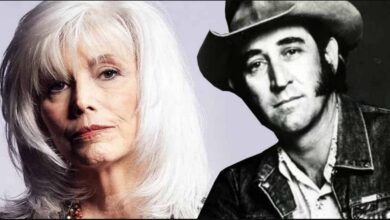Jim Reeves’ “Four Walls” Finds New Life Covered by Various Musicians
“Four Walls,” crafted in 1951, lay dormant for six years before it found its voice through Jim Reeves, with lyrics by Marvin J. Moore and music by George H. Campbell Jr. This ballad, steeped in melancholy, tells the tale of a love lost and the quiet agony of waiting in vain, with the silent walls as the sole witnesses to the heartache.
The song’s journey to recording seemed to mirror its theme of waiting, finally finding its moment when it caught the attention of Jim Reeves in producer Chet Atkins’ office. Despite Atkins’ initial hesitation, believing the song better suited for a female voice, Reeves’ persistence won out, leading to its recording on February 7, 1957. Reeves, known for his robust vocal style, took a different approach with “Four Walls,” delivering the song with a softer, more intimate tone.
For this recording, Reeves was joined by a talented ensemble: Bob Moore on bass, Chet Atkins on guitar, Farris Coursey on drums, Floyd Cramer on piano, and vocal harmonies by The Jordanaires. This collective effort saw “Four Walls” ascend to the top of the country charts and achieve a respectable position on the pop charts in 1957.
The song’s resonance was immediate, prompting a slew of artists to offer their own renditions. From its release in 1957 through to 1995, “Four Walls” saw numerous covers, each artist bringing their unique interpretation to the poignant narrative. In 1957, artists like Jim Lowe and Michael Holiday added their voices, with Lowe’s version achieving significant success on the Billboard charts.
The early ’60s saw interpretations by Kay Starr for her album “Just Plain Country” and Patti Page, who included the song in her album “Go on Home,” further solidifying its place in country music’s pantheon.
The mid-to-late ’60s brought more renditions from iconic figures such as Bing Crosby, Connie Francis, B.J. Thomas, and Jerry Lee Lewis, each contributing to the song’s legacy. The song’s appeal spanned decades, with Vera Lynn including it in her 1977 album “Vera Lynn in Nashville,” and Ronnie Milsap paying tribute to Reeves in 1981 with a cover that echoed the song’s opening line in the album title “Out where the bright lights are glowing.”
Willie Nelson’s 1995 version for his album “Just One Love” marked another chapter in the enduring story of “Four Walls,” showcasing its timeless quality and deep emotional impact.





